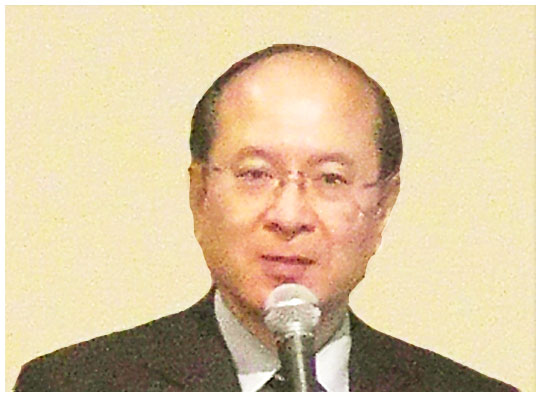第8回講演会

- 日程
- 2016年2月27日(土)
- 会場
- 東京コンファレンスセンター・品川
- 来場者数
- 約60名
- 講演内容
-
-
基調講演1
「消化器癌の癌幹細胞」
森 正樹(大阪大学大学院医学系研究科消化器外科 教授)
座長:山下 継史(北里大学医学部 外科学講座 講師)
-

進行癌や再発癌を抗がん剤で治療すると、がんは小さくなり、場合によっては消えてなくなる。しかしその多くは数カ月から数年後に再発する。そして抗癌剤が効かなくなっていく。癌細胞の中には、抗癌剤にやられやすい癌細胞と、やられにくい癌細胞があり、前者は最近「癌幹細胞」と呼称されている。
癌幹細胞は非常に手ごわい。抗癌剤の細胞外排出機能が高く、ストレス応答性の活性酸素への対応力に秀でている。そのため、癌幹細胞に対する創薬が喫緊の課題となっている。われわれは、癌幹細胞を可視化することにより、癌幹細胞の性質を調べると同時に駆逐物質の検出に務めているので、現時点での成果について発表する。
他方、われわれは、癌細胞をより穏やかな性質をもった細胞に作り替える「細胞リプログラミング」研究も進めている。生体内での安全性が確認されている3つのマイクロRNAを使って、正常細胞からiPS細胞を作成する方法を見出した。その3マイクロRNAを癌細胞に導入すると腫瘍形成能が著しく低下した。副作用の少ない治療法になる可能性があるため、あわせて紹介する。
-
基調講演2
「腸内フローラと免疫システム」
本田 賢也(慶應義塾大学医学部 微生物学免疫学教室 教授)
座長:安藤 潔(東海大学医学部 血液・腫瘍内科 教授)
-

哺乳類の腸管には、約1000種の細菌種が宿主と相互作用しつつ増殖しており、全体として「腸内フローラ」を構成している。最近の次世代シーケンサーを用いた腸内フローラ解析から、炎症性腸疾患、喘息、肥満、糖尿病、大腸がん、肝硬変など、様々なヒト疾患と腸内フローラの菌種構成異常が密接に関連していることが明らかとなってきている。腸内フローラの異常は「dysbiosis」とよばれており、構成菌種の「多様性の減少・単純化」がその特徴である。即ち腸内フローラ全体として保有する遺伝子数が減少し、全体として機能的に劣った細菌構成を指す。そしてdysbiosisが、ある種の疾患の「原因」となり、その改善が極めて有効な治療法となることが、便移植の臨床治験などから明らかとなっている。一方、dysbiosisがなぜ疾患に結びつくのか、その理由は明らかになっていない。理由の一つとして想定されているのは、免疫系の恒常性が、dysbiosisによって破綻するというものである。即ち、免疫系を活性化するような細菌種が優位となり、逆に免疫系を抑制するような細菌が減少しているため、その総体として、免疫系の異常活性化が誘導されるのではないか考えられている。こうした背景に基づき、還元化した研究システムの中で腸内細菌種の影響を個別に把握して行こうとする研究が注目されている。即ち、ある特定の細菌種だけをGerm-freeマウスに投与し、その細菌だけが存在しているノトバイオートマウスを作成し、その細菌種単独の影響を調べようとするものである。ノトバイオート技術と次世代シーケンサー解析を組み合わせることによって、腸内フローラの構成細菌それぞれが、どのように宿主免疫細胞の分化や機能に影響を与えているかが徐々に明らかになってきている。本講演では特に免疫系を中心に、徐々に明らかになりつつある腸内フローラの宿主への影響に関する知見を紹介する。
-
研究発表
「フェニルブチレートの癌感受性探索研究-乳癌・大腸癌・胃癌の比較」
山下 継史(北里大学医学部 外科学講座 講師)
座長:安藤 潔(東海大学医学部 血液・腫瘍内科 教授)
-

癌の治療は手術治療を含めた集学的治療が標準治療である。最も強い治療を要する高度進行癌では副作用が最大となっており、新たな薬剤を付加するゆとりはない。さらに進展した末期に近い癌になるとこのような強い治療が不能性となっておりなすすべがない。本研究では、そのような高度進行癌に対する新規治療法を開発することが目的である。PBが内服薬であることから、非消化器癌である乳癌から研究を開始し、大腸癌・胃癌と研究を拡大している。
乳癌においては、PB抵抗性株と感受性株が存在することが確認され、microarray を用いたrigorous analysis により Zeb1の epigenetic regulationが PB感受性に関わることが示され、Zeb1の発現は triple negative 乳癌で発現が強いことが確認された。今後、Zeb1発現の少ないと考えられる Her2/luminal type の再発乳癌を中心にPBの有効性を検討する臨床試験を展開したい。
Zeb1の発現は epithelial mesenchymal transition (EMT)の制御に重要で癌治療抵抗性と関わることが知られているので、消化器癌においても同様の hypothesisのもと、基礎実験を展開中である。大腸癌では Zeb1自身の発現が PB抵抗性と関連していなかった。よってmicroarrayを用いて包括的遺伝子検索を行った。その結果、抵抗性遺伝子は EMTに関わるものの epigenetic制御を受けていないことが判明した。候補遺伝子として Ascl-2, LEF1, TSPAN8に収斂してきている。一方、胃癌においては EMT関連遺伝子として同定されてきた抵抗性遺伝子は、epigenetic,制御遺伝子としてALDH7A1, CALD1があがってくるが、これらを制御する可能性のある感受性遺伝子候補として IGFBP2のみであった。一方、LGALS1は抵抗性株で発現の低下が epigeneticに制御されており、胃癌における hypomethylationが EMTに関わるという機序が考えられた。
結語として、PB感受性には EMT表現型が関連していると考えられたが、乳癌ではhypermethylation、大腸癌では genomic abnormality、胃癌では hypomethylationが重要である可能性が考えられた。今後、この仮説をさらに検証し PB感受性のある患者の臨床研究展開を目指していきたい。
-
The 8th symposium
- Speech
-
-
Special Lecture 1
"Cancer Stem Cells of Digestive System Cancers"
Masaki Mori(Professor, Department of Gastroenterological Surgery, Graduate School of Medicine,
Osaka University)Chairman: Keishi Yamashita (Lecturer, Department of Surgery, School of Medicine, Kitasato University)
-

When advanced cancers and recurrent cancers are treated with anticancer drugs, the cancers become smaller and sometimes disappear. Many of them, however, recur several months to several years later, and the anticancer drugs become ineffective. Cancer cells include cancer cells that are susceptible to anticancer drugs and cancer cells that are resistant to anticancer drugs, and the former have recently come to be called "cancer stem cells." Cancer stem cells are very tough. They have a strong anticancer drug efflux function, and superior ability to cope with the active oxygen species of the stress response. Consequently, drug discovery and development to combat cancer stem cells has become a very urgent task. Since during the course of investigating the properties of cancer stem cells by visualizing cancer stem cells we have been making efforts to simultaneously detect destructive substances, we will present our results as of the present.
We have also been pursuing research on "cell reprogramming," which converts cancer cells into cells that have more moderate properties. We discovered a method of producing induced pluripotent stem cells (iPS cells) from normal cells by using three microRNAs whose safety has been confirmed in vivo. When we introduced those three microRNAs into cancer cells, they greatly decreased their tumorigenicity. Because of the possibility of serving as a treatment modality with few side effects, we will describe that method as well. -
Special Lecture 2
“The gut flora and the immune system”
Kenya Honda (Department of Microbiology and Immunology, Keio University School of Medicine).
Chairman: Kiyoshi Ando (Professor, Department of Hematology and Oncology,
Tokai University School of Medicine) -

Approximately 1000 species of bacteria in the mammalian intestine interact with their host and grow, and together they constitute the "gut flora." Based on recent gut flora analyses performed with a next-generation sequencer close relationships are now known to exist between abnormal compositions of the bacterial species that make up the gut flora and a variety of human diseases, including inflammatory bowel disease, asthma, obesity, diabetes, colorectal cancer, and liver cirrhosis. Gut flora abnormalities are referred to as "dysbiosis" and are characterized by a "decrease or simplification of the diversity" of the constituent bacteria. In other words, the overall number of gut flora genes the intestine contains is reduced, and indicates a bacterial composition that is functionally inferior as a whole. Moreover, the fact that dysbiosis is a "cause" of certain diseases and that improving dysbiosis is a very effective treatment has been demonstrated by clinical studies of fecal transplantation, etc. However, why dysbiosis is linked to diseases has never been elucidated. One postulated reason is that immune system homeostasis breaks down as a result of dysbiosis. In other words, it appears that because the bacterial species that activate the immune system become predominant, and the bacteria that inhibit the immune system decrease, the net effect may be induction of abnormal activation of the immune system. Against this background, in the research systems in the past that have returned various findings related to the intestinal flora, research designed to identify the effect of individual bacterial species in the intestine has been attracting interest. More specifically, the research attempts to investigate the effects of a certain species of bacteria by administering only that species to germ-free mice thereby producing gnotobiotic mice that harbor only that specific species. By combining gnotobiotic techniques and analysis with next generation sequencers it has gradually become possible to determine the effects of each of the bacterial constituents that make up the gut flora on the differentiation and functions of host immune cells. In this lecture I will describe findings related to the effects of gut flora on the host, primarily on the host's immune system, which are gradually becoming clearer.
-
Research Presentation
“Exploratory study of cancer sensitivity to phenylbutyrate - Comparisons between breast cancer, colorectal cancer, and stomach cancer”
Keishi Yamashita (Instructor, Department of Surgery, Kitasato University)
Chairman: Kiyoshi Ando (Professor, Department of Hematology and Oncology,
Tokai University School of Medicine) -

Multi-modality therapy that includes surgery is the standard treatment for cancer. The adverse effects of treatment are greatest in far advanced cancer, which requires the most powerful treatment, and there is no latitude for the addition of new drugs. Moreover, such powerful treatments become ineffective in advanced cancers that have spread and are near the terminal stage, and nothing can be done. The purpose of this study was to develop a novel method of treatment for such far advanced cancers. Because phenylbutyrate (PB) is an oral drug, we started our study with a non-digestive system cancer, breast cancer, and then expanded it to colorectal cancer and stomach cancer.
The presence of PB-resistant lines and sensitive lines in breast cancer was confirmed, and rigorous analyses using microarrays showed that epigenetic regulation of Zeb1 is related to PB sensitivity and confirmed strong Zeb1 expression in triple-negative breast cancers. In the future we would like to conduct a clinical study of the efficacy of PB, primarily in recurrent Her2/luminal type breast cancers, which appear to express little Zeb1.
Since Zeb1 expression is known to be important in regulating the epithelial mesenchymal transition (EMT) and to be involved in cancer resistance to treatment, we are also conducting a basic experiment in gastrointestinal cancer based on a similar hypothesis. Expression of Zeb1 itself was found not to be related to PB resistance in colorectal cancer. We therefore performed a comprehensive gene analysis using microarrays. The results revealed that although resistance genes are involved in EMT, they are not under epigenetic regulation, and the candidates for the resistance genes have been narrowed down to Ascl-2, LEF1, and TSPAN8. On the other hand, the resistance genes ALDH7A1 and CALD1 identified as EMT-related genes in stomach cancer have been mentioned as epigenetic regulation genes, but IGFBP2 alone has been identified as a sensitivity gene candidate that might regulate them as a regulatory gene. By contrast, the reduction of LGALS1 expression in a resistant line is regulated epigenetically, and there appeared to be a mechanism that involves hypomethylation in the EMT in stomach cancer.
In conclusion, the EMT phenotype appeared to be related to PB sensitivity, but it appeared that hypermethylation may be important in breast cancer, genomic abnormalities in colorectal cancer, and hypomethylation in stomach cancer. In the future we would like to further verify this hypothesis and aim to perform a clinical trial among PB-sensitive patients.
-







